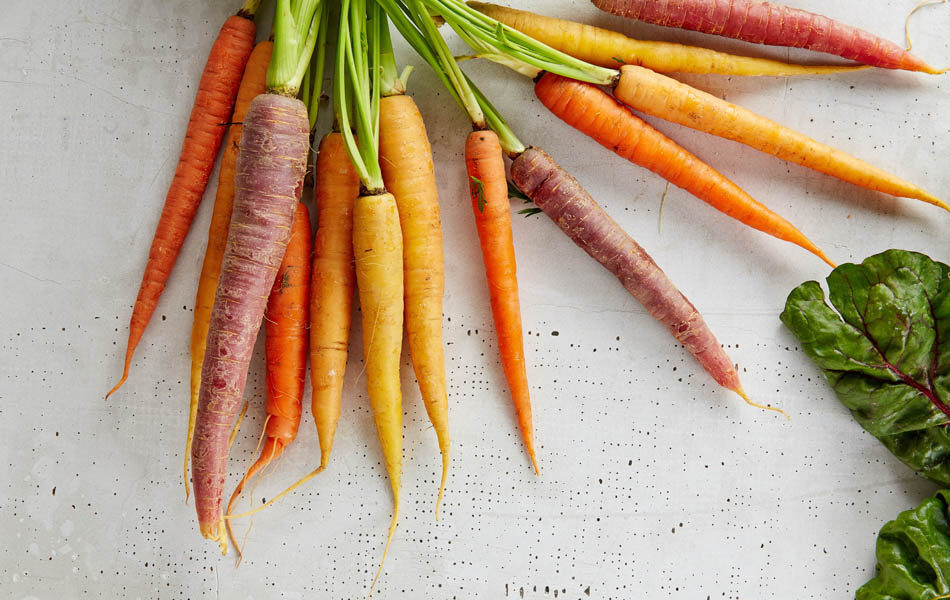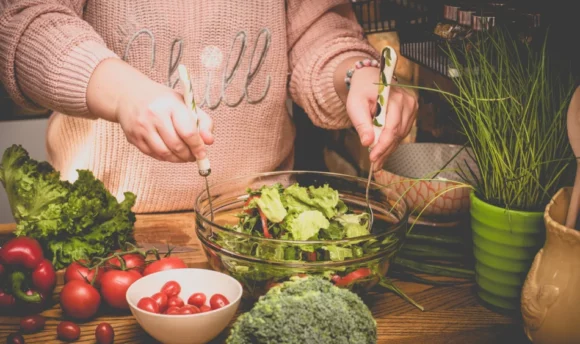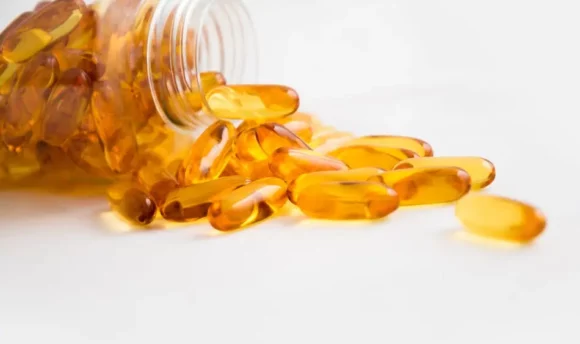Zero Calorie Foods: Guilt-Free Snacks for Your Diet
We reveal everything you need to know about zero calorie foods.

Keeping track of your calories is pretty standard for managing your weight loss goals. There are apps, trackers, and other tools to help you keep an eye on how many calories you’re burning versus how many calories you’re eating.
If you’re on a diet, you’re probably well aware of zero-calorie drinks, like diet soda. But did you know that there’s such a thing as zero-calorie foods?
Foods that have ‘zero calories’ or ‘negative calories’ are helpful when it comes to keeping your calorie intake in check.
If you’re new to foods that you can eat without adding to your calorie count, don’t worry. Our diet experts explain the concept of zero-calorie foods and negative-calorie foods.
What Are Zero-Calorie Foods?
Now, it may sound like ‘zero-calorie foods’ have zero calories, but that’s not quite the case. Despite the name, zero-calorie foods are actually otherwise known as ‘negative calorie foods.’ These foods take more energy to chew and digest than they have in calories, making them a net-zero while eating.
You may have heard of celery as food with negative calories because it takes more energy to eat than it provides your body.
A single stalk of celery has about six calories or less. And science has confirmed that eating celery burns 19 more calories than it provides. This means that when you have celery as a snack, you’re burning more calories than you’re eating.
Most of these foods tend to be naturally grown fruits and vegetables. And while they’re not really foods without calories, their calorie count is so low that you might as well count them as zero calories.
Are There Any Low-Calorie Foods You Can Eat a Lot of?
Non-starchy and low-calorie vegetables are tremendous diet-friendly snacks that you can eat a lot of, especially vegetable dishes high in fiber. Things like bell peppers, carrot sticks, celery, and even vegetable-based soups will fill you up without adding much to your calorie count.
For example, as mentioned before, celery is a perfect low-calorie snack to have during the day. Celery is high in water and fiber while being so low in calories that the act of digesting it burns more energy than what you’d get from eating it in the first place.
Of course, you should always eat in moderation, even if your foods are low in calories. But healthy, fiber-rich vegetables are a great way to snack throughout the day without messing up your calories for the day or spoiling your dinner.
Do Vegetables Have Calories?
All foods have calories. However, some vegetables are lower in calories than others. For the most part, more vegetables have a much lower calorie count than other foods, like fruits, meats, and processed snacks.
For example, a single carrot only has about 25 calories. On the other hand, something like a parsnip has closer to 125 calories. Most vegetables don’t have many calories, especially non-starchy vegetables.
But what these veggies lack in calories makes up for in being nutrient-dense, full of things our bodies need to survive and be healthy.
Eating your veggies every day means you’re getting your daily dose of minerals, vitamins, and other nutrients that you need.
What Fruit Has the Least Calories?
Some low-calorie fruits and berries include strawberries (32 calories per 100 grams), peaches (39 calories per 100 grams), honeydew melon (36 calories per 100 grams), and grapefruit (32 calories per 100 grams).
Fruits are generally low in calories and nutrient-dense. They make for a great snack on a diet, especially when you’re calorie counting.
Fruits are also naturally low in sodium and fat and high in nutrients that people generally don’t get enough of, like vitamin C, folic acid, dietary fiber, and potassium. Having a healthy helping of fruits in your diet lowers your risk of heart disease and high cholesterol.
List of Zero Calorie Foods: 18 Foods You Need to Know About
If you’re looking for foods that have very few calories, then look no further. Being able to snack in-between meals makes any diet much more enjoyable.
So, here is our zero-calorie foods list that you can have throughout the day.
#1 Celery (6 cal)
Celery calories are far less than the number of calories you burn while chewing and digesting this delicious, crunchy snack.
Of course, if you enjoy adding stuff to your celery sticks like peanut butter, your calorie count will go up. But by itself, celery is the number 1 low-cal snack.
#2 Apples (52 cal)
Apples are a great and easy-on-the-go snack that is relatively low in calories. While 52 calories may seem like a lot for 100 grams of apple, the effort it takes to eat and digest an apple will cut your net calories down quite a bit, making it one of the excellent low-calorie options.
#3 Kale (33 cal)
One cup of chopped kale is only 33 calories. Not only is kale a great salad snack for weight loss, but leafy green vegetables also have a variety of health benefits, including being packed full of nutrients that help keep you focused during the day.
#4 Blueberries (80 cal)
One cup of blueberries has only about 80 calories. If you’re trying to lose weight, then a handful of blueberries can help you when you’re looking for something sweet to snack on without the worry of weight gain.
#5 Asparagus (4 cal)
If you’re looking for negative calorie food, look no further than a large spear of asparagus.
Asparagus calories are far less than what you’ll burn eating and digesting it. Asparagus is also rich in fiber and helps with lower body weight loss.
#6 Carrots (25 cal)
One medium carrot will net you about 25 calories.
Carrots are perfect for weight loss and when you’re looking for something crunchy and sweet but trying to stay healthy, which means you need to avoid candies. Carrots can also help lower your cholesterol levels.
#7 Brussel Sprouts (38 cal)
If you’re in the mood for a delicious snack that is also highly nutritious, you might want to try Brussel sprouts. They have 38 calories per cup.
The fiber in Brussel sprouts will also help you feel full for longer.
#8 Cauliflower (27 cal)
There are only about 27 calories per cup. This vegetable is ideal for weight management and a significant source of nutrients, including fiber and vitamins C, K, and B6.
Cauliflower has also been linked to a lowered risk of cancer and heart disease.
#9 Broccoli (31 cal)
Broccoli only has about 31 calories per cup. It’s an easy vegetable to add to your diet.
It’s great to add to your meals for a bit of flavor and crunch, or even to enjoy as a low calories snack in between meals.
#10 White Mushrooms (16 cal)
Whether you’re looking to lose weight or trying to get other health benefits, white mushrooms are a tremendous zero-calorie food thanks to their high levels of vitamin D, selenium, and phosphorus.
White mushrooms’ calories per cup are about 16 calories, making them great for weight loss and adding flavor to your dish.
#11 Papaya (62 cal)
While papaya is a little higher in calories per cup than some other foods on the list, it contains plenty of vitamins, including C, A, B, E, and K.
Papaya is an excellent source of fiber, which helps with weight loss and keeps you regular.
#12 Radishes (18 cal)
One cup of radishes nets about 18 calories, a great zero-calorie food. Radishes are high in fiber, calcium, potassium, and antioxidants.
A cup of radishes added to your meal can help reduce your overall calories and help you feel full.
#13 Strawberries (47 cal)
One cup of strawberries is just 47 calories and is full of manganese, folate, and vitamin C.
These low-calorie fruits are incredibly nutritious and high in fiber, which can help you feel full and curb your appetite throughout the day.
#14 Spinach (7 cal)
This leafy green is one of the best zero-calorie foods. One cup of spinach is just seven calories, while 100 grams of spinach is only 23 calories.
Spinach is a great leafy veggie to add to your salads or sandwiches for a delicious crunch and much-needed nutrients.
#15 Tomatoes (22 cal)
One medium red tomato only has 22 calories. This means that just using a slice or two of tomato in your salad or on your sandwich makes a tomato a great zero-calorie additive. Plus, they are full of potassium, lycopene, and vitamins B and E.
#16 Watermelon (46 cal)
What’s better on a hot summer day than a cup of watermelon? Watermelon is only about 46 calories per cup.
About 90% of watermelon weight is actually water, making it perfect for keeping you hydrated. It’s also high in fiber, antioxidants, and vitamin C.
#17 Turnips (36 cal)
Turnips have been shown to help lower someone’s chances of diabetes and heart disease.
If you’re looking to lose weight, turnips are a great low-calorie snack, with only 36 calories per cup. Turnips also help increase your energy, so they’re great for pre-workout.
#18 Zucchini (21 cal)
Zucchini is only 21 calories per cup. This particular squash is rich in water, which, combined with its low-calorie count, helps you feel full for longer.
You can enjoy a zucchini snack without worrying about the numbers on the scale.
A Word From Our RD
Finding the right low-calorie foods can be difficult when you’re working to lose weight. That’s why finding the right, healthy snacks that can produce a negative calorie balance is incredibly beneficial.
Zero-calorie foods are a great way to help facilitate weight loss. Many of these foods are high in nutrients while being so low in calories that you’re doing more work eating them than other foods.
While many zero-calorie foods aren’t that great to eat by themselves, they’re often wonderful to add together into a low-calorie dish or perfect to add some low-calorie flavor to your favorite meals.
Not to mention, these zero-calorie foods are part of a balanced diet. You’re ensuring that your body gets enough nutrients while still having an extremely low-calorie count that will help you lose weight.
If you’re just starting on your weight loss journey, take some time to find the best low-calorie foods that you think you’ll enjoy and will be easy for your to make. A diet high in fiber-rich fruits and veggies will help your weight loss and gut health.
Conclusion
Did you find something delicious to snack on on our zero-calorie foods list?
While zero-calorie food isn’t actually free of calories, most of them have so few calories that eating and digesting them puts you at or near zero calories anyway.
Fruits and vegetables are essential for any diet, especially a diet where your main goal is weight loss. Fruits are high in vitamin C, which helps you repair body tissue and keep your teeth healthy, while vegetables are packed full of nutrients and dietary fiber.
Whether or not you’re trying to lose a few pounds, you should keep this list of fruits and veggies in mind when craving something sweet, crunchy, or flavorful. They all have fewer calories than processed snacks, sweets, or pastries.

















































 Select your language:
Select your language: 








